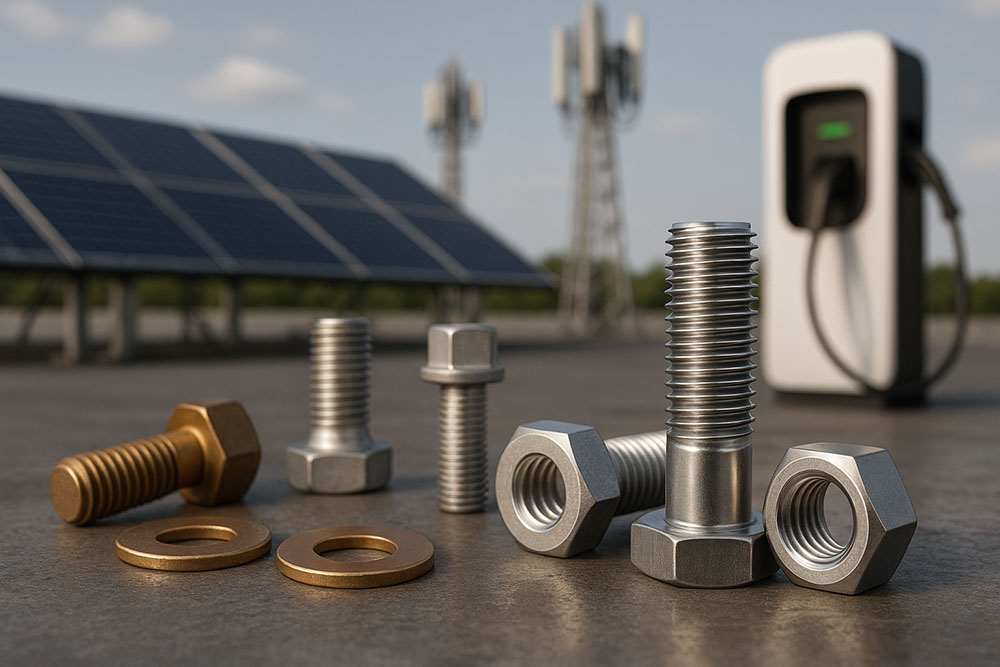In today’s fast-evolving industries—such as clean energy, telecommunications, and electric vehicle (EV) infrastructure—the demands on hardware are greater than ever. The need for fasteners that are strong, corrosion-resistant, lightweight, and sustainable is driving innovation in materials. At Allied Bolt & Screw, we recognize the importance of staying ahead of these trends by offering high-performance materials tailored to meet modern engineering needs.
Why Advanced Fastener Materials Matter
Whether you’re building a solar farm, erecting a 5G tower, or assembling components for EV charging stations, your fasteners need to perform under pressure. Traditional carbon steel bolts, while effective in many environments, often lack the necessary resistance to corrosion or weight-saving benefits demanded by high-performance applications.
This is where advanced materials step in. Let’s look at the most commonly used materials and why they matter:
1. Stainless Steel
Grades like 304 and 316 stainless steel are known for their superior corrosion resistance, especially in marine or high-humidity environments. Stainless steel is an ideal choice for telecommunications towers, outdoor electrical enclosures, and renewable energy equipment. At Allied Bolt, we stock a wide range of stainless steel fasteners that meet these rigorous demands.
2. Silicon Bronze
Used heavily in the marine industry and in grounding applications, silicon bronze fasteners are naturally corrosion-resistant and non-magnetic. Their durability and electrical conductivity make them a go-to for electrical and utility infrastructure, such as grounding hardware.
3. Aluminum Alloys
Aluminum fasteners are significantly lighter than steel while offering a good balance of strength and corrosion resistance. Though not as strong as steel, aluminum is often used in lightweight structural applications like EV infrastructure, solar panel frames, and aerospace. Their high strength-to-weight ratio helps reduce load without sacrificing performance.
4. Titanium
Titanium fasteners offer excellent strength, low density, and unmatched corrosion resistance, even in highly acidic or chloride-rich environments. Though expensive, titanium is ideal for critical and weight-sensitive applications, such as high-performance electric vehicles and offshore structures.
5. Zinc-Plated and Galvanized Steel
To balance cost and corrosion resistance, many of our customers opt for hot-dip galvanized or zinc-plated fasteners. These coatings offer moderate protection against rust, making them suitable for outdoor or moderately corrosive environments.
Applications That Demand Material Innovation
- Telecommunications: 5G towers and cellular masts require corrosion-resistant fasteners that can withstand constant exposure to weather.
- Clean Energy: Wind turbines and solar farms benefit from stainless and galvanized options that resist environmental degradation.
- EV Infrastructure: Lightweight aluminum and advanced coatings reduce weight and resist wear in charging stations and battery systems.
Why Choose Allied Bolt & Screw?
Since 1955, Allied Bolt & Screw has been a trusted source for high-quality, high-performance fasteners. Our extensive inventory includes a wide range of materials to meet every application, from everyday zinc-plated bolts to highly specialized stainless and bronze options. Need help selecting the right material? Contact us today—our experts are ready to help.
Further Reading
Stay ahead of the curve with Allied Bolt & Screw—because the future is built on better fasteners.




